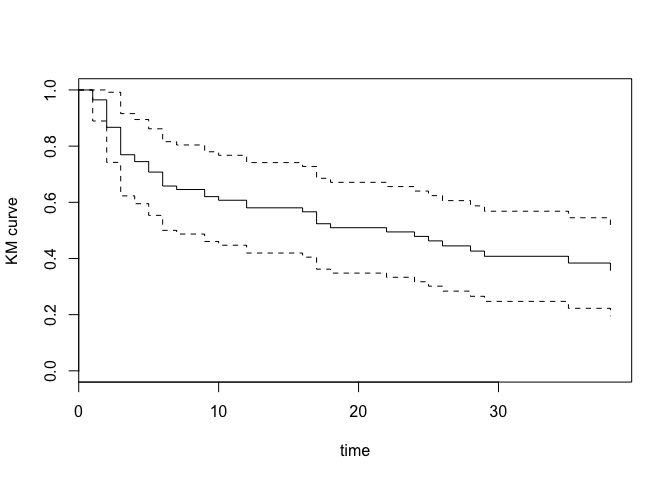
The hardware and bandwidth for this mirror is donated by dogado GmbH, the Webhosting and Full Service-Cloud Provider. Check out our Wordpress Tutorial.
If you wish to report a bug, or if you are interested in having us mirror your free-software or open-source project, please feel free to contact us at mirror[@]dogado.de.
This package approaches simultaneous confidence bands for survival functions purely from an optimization perspective: given a certain coverage level, obtain bands such that the area between is minimized. This is achieved through an approximate solution based off local time arguments for both the survival and cumulative-hazard functions.
install.packages("devtools", repos="http://cran.rstudio.com/")
library(devtools)
devtools::install_github("seasamgo/optband")
library(optband)opt.ci(
survi, # object of class 'survfit'
conf.level = 0.95, # confidence level
fun = 'surv', # time-to-event function ('surv' or 'cumhaz')
tl = NA, # truncation lower bound
tu = NA, # truncation upper bound
samples = 1 # 1 or 2 sample case
)opt.ci takes a survfit object from the
survival package as input and returns a survfit object with
confidence bands for the specified time-to-event function (e.g. the
two-sample cumulative hazard difference function). Additional optional
parameters include the confidence level 1 − α, optional upper
or lower bounds for data truncation, and the number of samples to
consider (1 or 2).
Please view the corresponding help files for more.
Obtain minimal-area confidence bands for bladder cancer data from the
survival package:
library(survival)
## 1-sample case
dat <- bladder[bladder$enum==1,]
s <- survival::survfit(Surv(stop, event) ~ 1, type = "kaplan-meier", data = dat)
optband_s <- optband::opt.ci(s)
plot(optband_s, xlab = "time", ylab = "KM curve", mark.time = FALSE)
These binaries (installable software) and packages are in development.
They may not be fully stable and should be used with caution. We make no claims about them.
Health stats visible at Monitor.